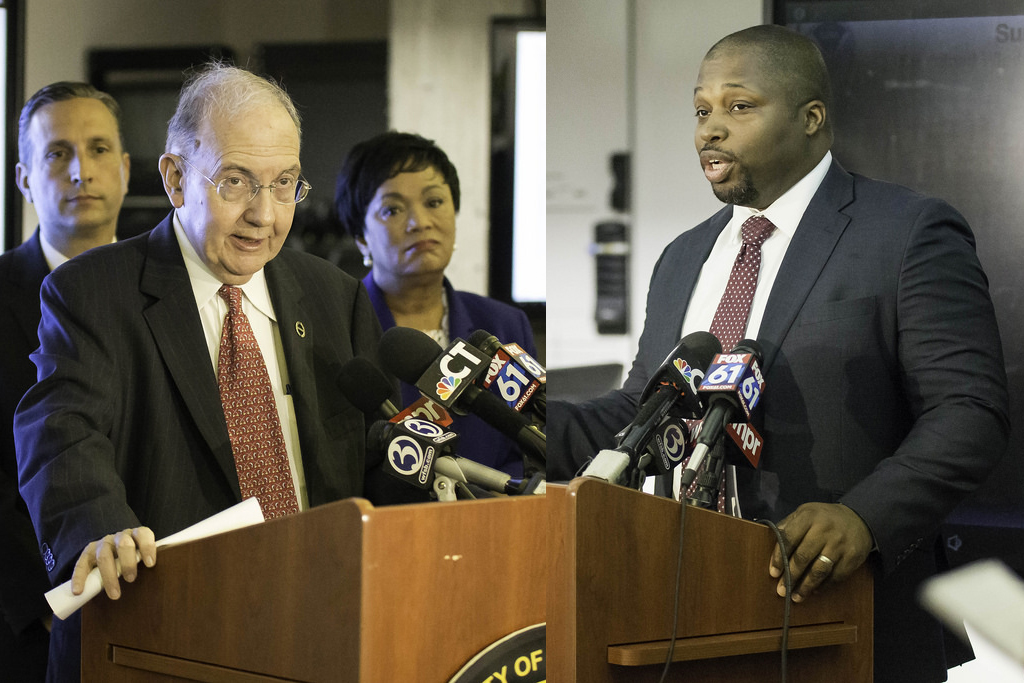
Wikimedia
New Haven legislators in the Connecticut General Assembly met with roughly two dozen community member’s on Saturday at Wooster Square Coffee to discuss current legislative issues and initiatives for the Assembly’s ongoing session in Hartford.
Senate President Pro Tempore Martin Looney, D-New Haven, and state representative Roland Lemar, D-New Haven, expressed appreciation towards attendees who took the time to discuss state-level issues. Throughout the conversation, the legislators covered issues such as tolls and educational programs, among other topics.
Before Looney and Lemar even arrived Saturday, roughly half a dozen protesters lined the streets to make the case against implementing new tolls on four major Connecticut highways — a recent initiative being considered in Hartford.
Most of the protesters were not New Haven residents. However, Lemar serves as the chair of the house transportation committee that is currently considering the toll issue, and Looney is the top Democrat in the state Senate, which gave the protesters incentive to show up to the event. Shortly before the conversation began, the protesters raised concerns with the representatives that the middle and lower–class Connecticut citizens would end up footing the bill for tolls.
“Tolls are just another tax. Add that to all the other taxes that they’re going to try to shove down the middle classes throat, we just can’t afford it.” Linda Shapiro of Southbury, Connecticut told the News. “It’s a money grab for whatever they think they’ll need, whenever they want.”
Nevertheless, once the event started inside the shop, Looney and Lemar both cited support for the tolls — with seemingly little pushback from anyone in the audience inside. The protesters did not enter the coffee shop.
Lemar emphasized that approximately 40% of the toll money would be paid by out-of-state drivers, saving Connecticut residents money but giving the state vital funds to rebuild a crumbling transportation system. Lemar mentioned that the tolls would also help decrease congestion on busy roads and that the initiative is favored by many businesses who want to ensure that their workers can safely travel to work.
However, protesters disagreed with Lemar’s evaluation that most state residents are in support of tolls.
“Most people we talk to don’t want tolls. It’s bipartisan. There are Democrats, Republicans, Libertarians, Independents who don’t want it,” Cathy Politi of Fairfield, Connecticut told the News.
The event also featured a myriad of other topics. Looney discussed the legislature’s challenge of raising enough money to support various government services. He said that many rich and upper-class Connecticut residents hold most of their wealth in untaxable investments. As a solution, Looney is proposing a “mansion tax” bill during this legislative session, which would raise taxes on properties worth $750,000 and over.
Prompted by a question from New Haven mayoral candidate Urn Pendragon, Lemar discussed renewable energy and Connecticut’s commitment to weaning off of fossil fuel use by 2030 and even more so by 2040.
Hartford legislators are also considering implementing African American studies and Latino and Puerto Rican studies into the social studies curriculum of Connecticut public schools. Lemar noted his support of this curriculum change and expressed confidence that such an initiative would pass this legislative session. He agreed with attendees that it is important for all Connecticut students to learn these histories in a comprehensive way and expressed his commitment to introducing this new curriculum in the most successful way possible.
Elm City resident Randy States noted his support for the legislators’ attempts to connect with their constituents — even as he holds a pessimistic view of politics today.
“I don’t like the way things are going right now. There are some issues I support, and I want to encourage that.” States said. “More than anything, it’s the heated political nature of the time. I can’t just let it go by without saying something.”
Connecticut’s 2019 legislative session began on Jan. 9 and will end on June 5.
Emmett Shell | emmett.shell@yale.edu







